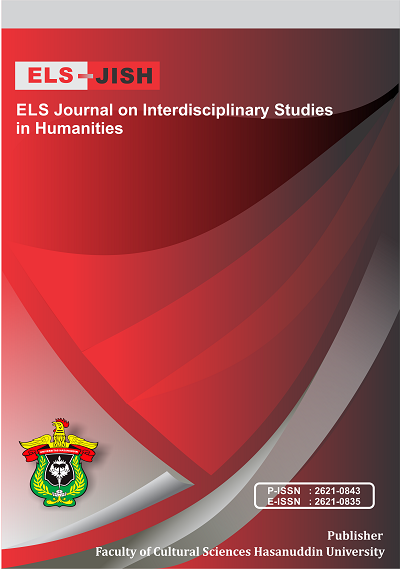Using Mapping Pivotal as Teaching Moral Education Material and Historical Meaning in Banten Literature
DOI:
https://doi.org/10.34050/elsjish.v6i3.28271Keywords:
Banten Legend, Character Education, Historical Meaning, Mapping Pivotal TableAbstract
The objective of this study is to obtain appropriate learning materials of character education using Mapping Pivotal Table in Banten Literature. This research is a qualitative research through content analysis method. The data is taken from Banten Legend; “Legend of Kiai Gede”, “Nyai Bansari”, “The Seven Wells”, and key informant with expert. In analyzing the data, the researcher used character table by Bohlin’s theory (2013) that consist of moral starting point, 1st morally pivotal point, 2nd morally pivotal point, challenge point, and new change. The result of this research showed that Banten Legends contain moral educational values. The moral educational values are religious, hard worker, patriotism, never give up, responsibility, sincerity, caring other people and mutual respect (Solehat & Ramadan, 2021). The result found a close relationship between the stories with historical of Banten. “The seven Wells” are location in Serang-Banten and people believed that they brought God’s mercy for women life. And women who want to get married are advised to bathe in the water of the seven wells so that it brings blessings for a new life. The early time to be Pandeglang or the regency is known well as the place of religious men which found in the explanation of the legend of Kiai Gede. And Nyai Bansari showed Banten women are smart and brave who fight for the independence of their nation (Murhandono and Juwono 2014).Downloads
References
Andini, C. (2017). Children Emotion in The Movie" Big Hero 6 (Doctoral dissertation, Doctoral dissertation, Universitas Islam Negeri Alauddin Makassar).
Anwar, K., Zurmailis, Z., Febrianti, M., Rangkuti, L. M., & Soares, A. C. (2021). Hegemony of Legend Literation in Literature and The Environment in the Digital Era (Hegemoni Literasi Legenda Dalam Sastra Dan Lingkungan Di Era Digital). Jurnal Gramatika: Jurnal Penelitian Pendidikan Bahasa dan Sastra Indonesia, 7(1), 57-68.
Ayatrohaedi. (2005) Sundakala : Pustaka Rajya-rajya i Bhumi Nusantara. Pustaka Jaya, Jakarta.
Bohlin, K. (2005). Teaching Character Education through Literature: Awakening the moral Imagination in Secondary Classroon. London and Newyork: RoutledgeFalmer.
Burke, P. (2004). Languages and communities in early modern Europe. Cambridge University Press.
Djojosuruto. (2006). Analisis Teks Sastra dan Pengajarannya, Yogyakarta: Penerbit Pustaka. Pendidikan Karakter Dalam Folklor; Konsep, Bentuk , dan Model. Yogyakarta: Pustakah Rumah Suluh.
Endraswara S. (2013). Folklor Nusantara; Hakikat, Bentuk, dan Fungsi. Yogyakarta: Pustakah Rumah Suluh.
Fathinnaufal, M., & Hidayati, D. (2020). The Implementation of character education in elementary school. Journal of Educational Management and Leadership, 1(2), 31-38.
Junaid, S., Ahmad, Nurhidayah, Mujizat, A., & Andini, C. (2023). The Quality of Human and Non-Human Relation in Indonesia and England Portrayed in the Selected Picture Books. ELS Journal on Interdisciplinary Studies in Humanities, 6(2), 211-218.
Klarer M. (2004). Literary Studies. London and New York: Routledge Taylor and Francis Group.
Lazar G. (2009). Literature and Language Teaching; A Guide for Teacher and Traines, Singapore: Cambridge University Press.
Lickona, T, Schaps E & Lewis C. (2002). Eleven Principles Of Effective Characracter Education. Washington DC: Character Education Partnership.
Mardioko, E. T. (2012). The Moral Values of "The Darkness of Gatotkaca" Novel. Salatiga: STAIN Salatiga.
Marhandono, D. & Jowono H. (2014). Banten Sumber Potensi Heorisme di Nusantara, Serang – Banten. Dinas Kabupaten dan Pustaka Provinsi Banten.
Putri, D. D. W., & Simanjuntak, M. B. (2022). Analysis of Moral Values in Tere Liye’S Novel “Pulang”. LITERACY: International Scientific Journals of Social, Education, Humanities, 1(1), 21-25.
Rahman, F. (2022). Fungsi dulce et utile Sastra dalam Pemertahanan Karakter Bangsa. https://doi.org/10.31219/osf.io/u6jtf
Rahman, F. F., Ahmad, T. W. B., Badaruddin, S., Amir P., M., & Andini, C. (2023). Moral Values in the Film Not One Less《一个都不能少》 张艺谋对《一个都不能少》电影道德价值分析. ELS Journal on Interdisciplinary Studies in Humanities, 6(2), 376-390.
Rahman, F. (2018). The Constraints of Foreign Learners in Reading English Literary Works: A Case Study at Hasanuddin University. Journal of Arts and Humanities, 7(2), 01-12.
Suyatno. (2012). Pendidikan Holistik: Peran Pendidikan Holistik Dalam Membangun Karakter Bangsa. Jakarta: Uhamka Press.
Solehat, T. L, dan Ramadan, Z.H. (2021). Analisis Program Penguatan Pendidikan Karakter pada Mata Pelajaran Pendidikan Agama Islam di Sekolah Dasar. Jurnal Basicedu, 5 (4). 2270-2277. http:// doi.org/10.24191/ajue.V17.12609.
Tomlinson B. (2007). Developing Materials For Language Teaching. London and New York: Cromwell Press.
Undang-Undang Republik Indonesia No 20 Tahun 2003. Sistim Pendidikan Nasional.
Downloads
Published
How to Cite
Issue
Section
License
Copyright (c) 2023 Nurhaedah Gailea

This work is licensed under a Creative Commons Attribution-ShareAlike 4.0 International License.

















